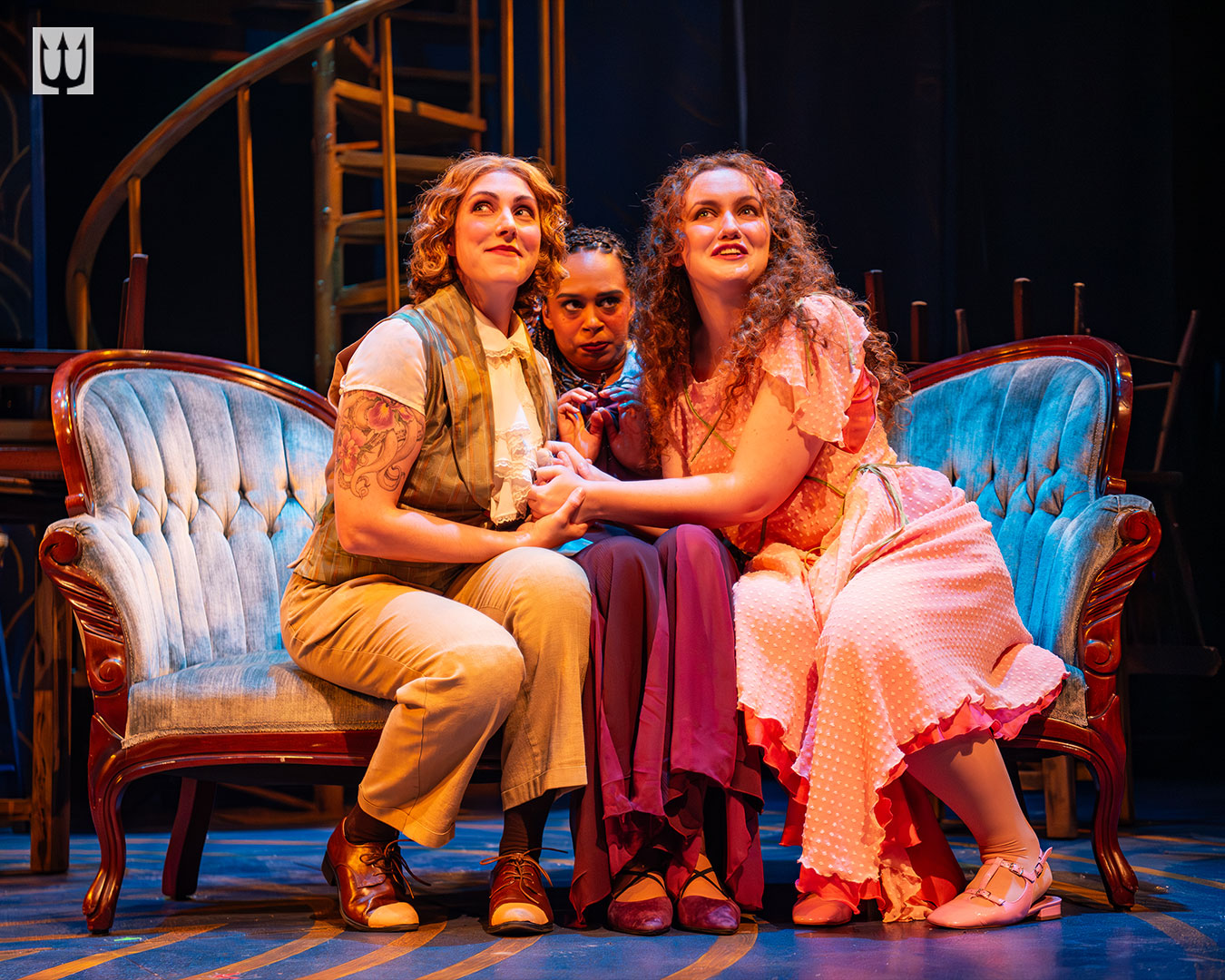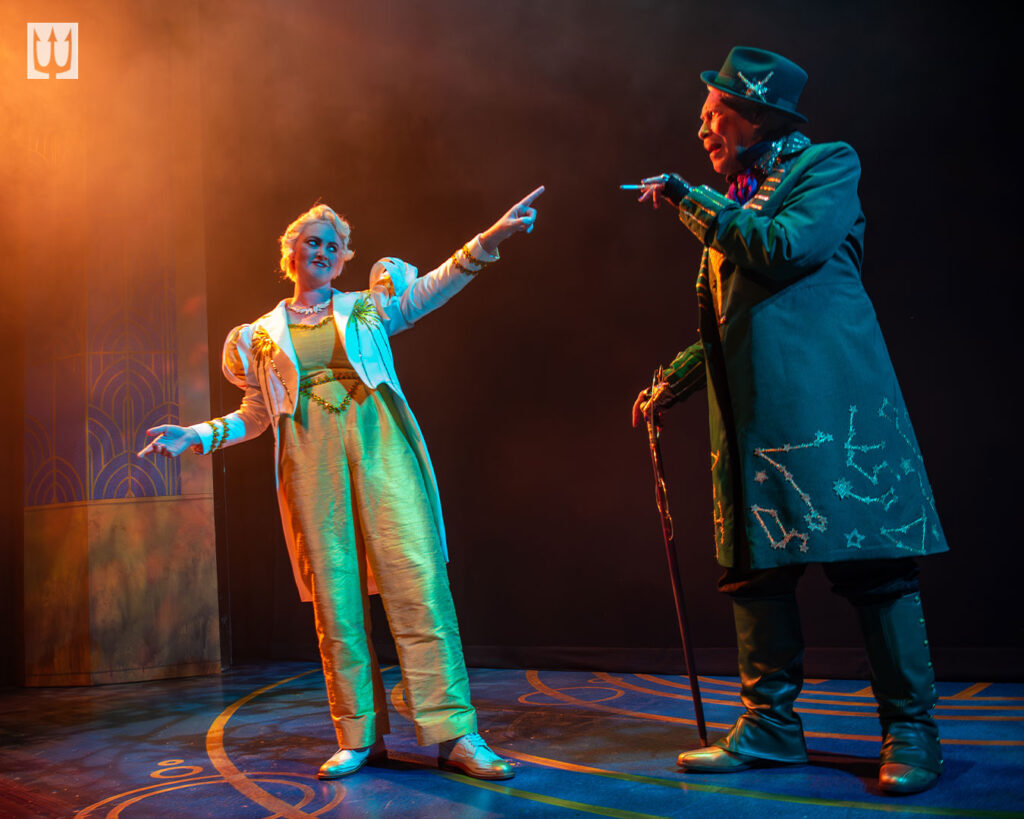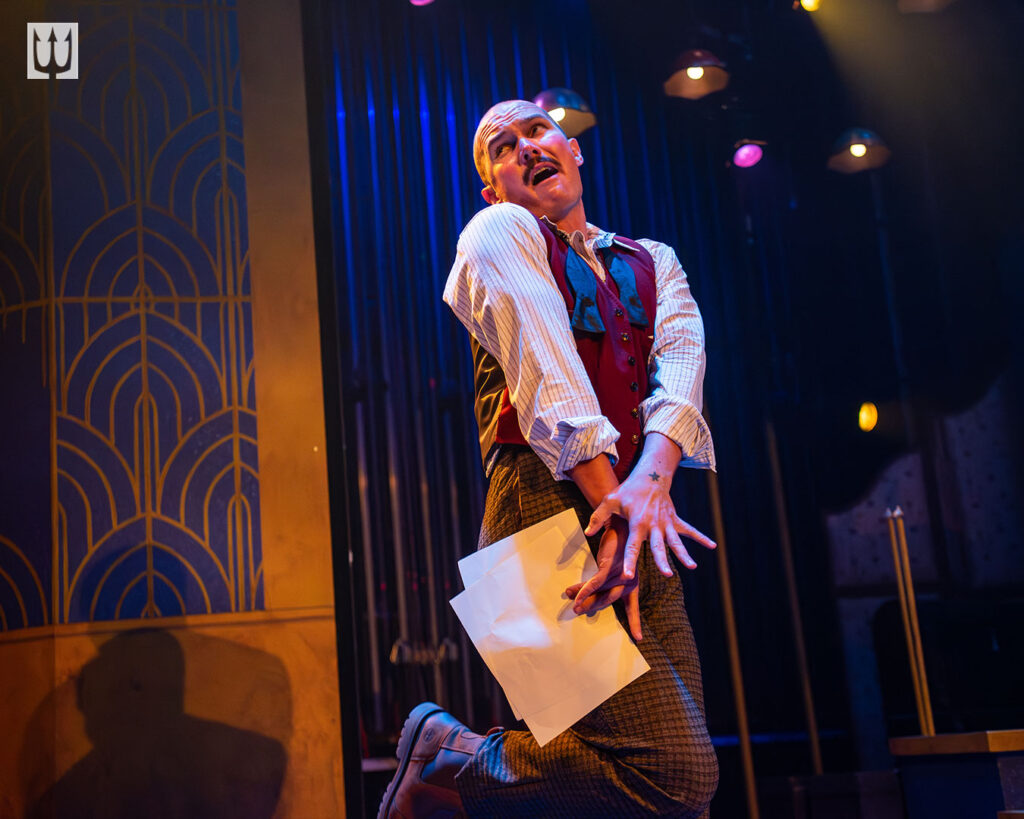
Kathleen Dorian, Kih Becke & Sophie Wilcott. Photo by Stoo Metz.
Since the early days of my undergraduate degree in Theatre Studies at Dalhousie I have read about Peter Brook’s “landmark” 1970 production of A Midsummer Night’s Dream. It was in learning about this production that I was introduced to the concept of there being seminal productions of particular theatre works, especially those of Shakespeare which are performed consistently, especially in North America and the United Kingdom. I always wondered what a “definitive” version of one of Shakespeare’s works might look like for me. I found one early on with Necessary Angel’s Hamlet in 2009, and I found one on Friday evening with A Midsummer Night’s Dream at Neptune Theatre.
Jeremy Webb has set what is often seen as one of Shakespeare’s more frothy comedies in a queer speakeasy, so an underground space within an already underground world, in the 1920s, in what I assume from some of the accents is either New York, Chicago, or Boston. Within this framework we are treated to a story about six working class folks who are, to varying degrees, passionate about the theatre, although they are not well versed in all of its conventions and nuances, but who are, nevertheless, doing their very, very best to present Pyramus and Thisbe for the wedding of their King and Queen (Theseus and Hippolyta). Around them, within this magical shape-shifting space where gender bends and there is a freedom for everyone to perform their truest selves or to try on a new alter ego just for the evening, is a faerie world where Oberon, King of said faeries, attempts to use his mischievous minion Puck to both humiliate the faerie Queen, Titania, and also help to fix a human love triangle they have happened upon in the woods. When Puck mistakes Lysander for Demetrius, however, the triangle goes from bad to worse and shenanigans ensue.
If you are familiar with this play and have not seen this production you may have noted that it’s strange that I mentioned the mechanicals first in my synopsis of this story. In many readings and performances of this play these characters exist as a subplot to the narrative about the lovers fleeing Hermia’s tyrannical father, and Demetrius, who loves Hermia, following after them, with poor Helena, who loves Demetrius, trailing desperately after him. Sometimes the subplot, especially the full production of the play within the play (Pyramus and Thisbe) can seem overly long and detracting from the more “important” story, in ways that can even sometimes be tedious. Here, it is as though Webb has grabbed everything at the back (or bottom?) of the play and hauled it all to the forefront, so it feels like we are seeing the whole thing with fresh eyes. But instead of shoving Oberon, Titania and the lovers backward, they are snugly nestled around the amateur actors so the two stories are more tightly intertwined. The effect makes the play seem four hundred years more contemporary.
Helping to give the play its breakneck speed and modern feel is the fact that the story is told by an ensemble of just nine actors. Jess Lewis’ lightning design and Aaron Collier’s sound design also work wonders at isolating moments and characters in ways that give the audience, especially those already familiar with the story, ample information without needing a lot of text, so we are encouraged to see this story unfold in a way that is very sleek and crisp and almost filmic at times.
Kait Post plays Titania/Hippolyta and Emma Slipp plays Oberon/Theseus and as Titania and Oberon Post and Slipp have this emotionally charged energy of people who are sexually attracted to one another, and yet angry at each other, and both are holding their own on equal footing. Slipp’s Oberon, especially in her costume by Kaelen MacDonald, evokes drag king imagery, which suggests that Oberon’s darkly misogynistic plan both to essentially pimp his partner out to a donkey-man for kicks, and steal her “changeling” boy, for purposes that Shakespeare leaves to our own imaginations, is also a performance of this kind of toxic masculinity. We can see how dark and fucked up this is, but the play is also shining the light through playfulness at how normalized the dark and fucked up has become. The constant backdrop of the queer speakeasy also allows space for us to not be sure what the truth is about the relationship between those playing as Titania, Oberon, and Bottom: perhaps this is all consensual role play after all.
Sophie Wilcott plays Hermia, at first very much like a Victorian china doll come to life, the apex of femininity. The fact that she is in love with Lysander, played by Kathleen Dorian, playing a very sweet and tender version of masculinity, while being pursued by Demetrius, played by Santiago Guzmàn, who is the more stereotypical version of the male hero, is wildly interesting. Kih Becke, sardonic and gutsy as Helena, hilariously, could be seen as the most pathetic of the four, following Demetrius around, despite the fact that at one point he says he would like to kill her. Yet, here, Helena is assertive, and headstrong. She is the woman who sees what she wants and fights like fire until she has vanquished all obstacles and stands victorious in the wake of the destruction around her. Wilcott’s Hermia too, comes into her own power when faced with injustice. None of these characters are being played in ways that we typically see, and so it brings out new meanings in Shakespeare’s text, and a different lens through which to see the play.

Walter Borden plays Puck very much as wisdom, and specifically perhaps as “queer wisdom,” which, historically, has absolutely belonged to the shadows. Puck is what links this story to the stories of a past generation, which may have existed in a different secret underground space where stories tend to get lost to time. He may be Oberon’s lackey here, but this too seems like perhaps just a role he assumes for the sport of it. Puck is the conduit of the magic, and it is the magic that gives the other characters the license to explore aspects of their gender and sexualities that they repress otherwise. We see in Borden a deep knowing that this is the power and the gift he is sharing with those who are less experienced in these matters than he is.
The abject earnestness of the mechanicals, played by Kathleen Dorian (bossy Quince), Santiago Guzmàn (Starveling as Moonshine), Ailsa Galbreath (Flute, with some Moira Rose-inspired intonations), Kih Becke (as Snout as Wall), Sophie Wilcott (as Snug as Lion), and James MacLean (as Bottom) is what makes them such endearing and hilarious pillars of this production. They want to present the most professional version of this play possible, and they are woefully unequipped to do so, but the audience has fallen so in love with them that their best truly becomes the best, regardless of critical merit.

While this play is in many ways the very definition of an ensemble piece, I sincerely hope it will go down in Haligonian theatre history as the production that launched James MacLean to whatever constitutes stardom for a theatre actor in this province. I know, again, I haven’t adequately captured how funny this production is. It is very funny. My sides were aching from laughing so hard, and James MacLean as Bottom is constant comedic brilliance. Bottom is the theatre’s most enthusiastic fan: he wants to play all the parts with the exuberance of a five year old waiting in line to meet Mickey Mouse. MacLean gives an incredible performance of both sweetness and hilarity that roots the play nicely, within Webb’s darker overall concept, in the spirit of playfulness and comedy.
In the same way, of course, director Jeremy Webb finds all sorts of opportunities for unexpected moments of silliness and bits where you can see clearly the evolution throughout history from this specific play to melodrama to Saturday morning cartoons. The characters chase one another up and down a ladder, there are physical fights, there is very fun use of props, and of course, a play within a play that needs to be so bad that it is excellent. Jeremy Webb’s distinct sense of humour and his ability to imaginatively meld Shakespeare’s funny with Vaudeville/Panto/Bugs Bunny funny works really beautifully here.
It is a production that is both sidesplittingly funny, but also very thought-provoking in a way that isn’t at all heavy-handed. In the same way that theatre nerds loved Peter Brooks’ production of A Midsummer Night’s Dream so much that they famously have continued to write essays analyzing it for decades since, I postulate that perhaps the same may be said about this production someday as well.
Neptune Theatre’s production of A Midsummer Night’s Dream, written by William Shakespeare and directed by Jeremy Webb, plays at Fountain Hall (1593 Argyle Street, Halifax) until October 5th, 2024. Performances are Tuesdays to Sundays at 7:30pm with 2:00pm matinees on Saturdays and Sundays. Tickets range in price from $33.00 to $65.00 based on seating. Tickets are available at this link, by calling the Box Office at 902.429.7070 or in person at 1593 Argyle Street. When you book your tickets you may be asked if you would like to purchase additional access to Shadows: the A Midsummer Night’s Dream Pre-show, which will take you to a top-secret speakeasy within Neptune Theatre an hour before the 7:30pm show for a special performance. Tickets for this event are extremely limited and going fast! You will be be prompted to add this show to your ticket on the website once you have booked your seats- or ask about it at the Box Office!
Key Performances
Industry Night
Tuesday, September 17 – 7:30 PM
Talkback
Thursday, September 19 – 7:30 PM
Masked Performance
Sunday, September 22 – 2:00 PM
Please note: this show is recommended for ages 14+
A Midsummer Night’s Dream is set in the 1920’s during Prohibition and contains suggested use of alcohol, some sexual innuendo, kissing and suggested sex.
Neptune Theatre is fully accessible for wheelchair users. For more Accessibility Information Click Here.





 World Theatre Day: My God Is It Ever The Time to Invest in Canadian Plays
World Theatre Day: My God Is It Ever The Time to Invest in Canadian Plays 